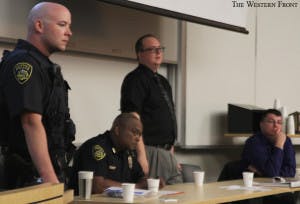You have the right to remain silent. You have the right to speak with an attorney. You have the right to refuse field sobriety tests.
These are rights that all citizens, including students, have when interacting with the police.
Know Your Rights, presented by the Associated Students Legal Information Center, aimed to educate students on their rights when encountering the law.

The panel discussion, held on Tuesday, Sept. 29, was made up of three lawyers and two Western police officers, who discussed driving under the influence, minor in possession charges, and interaction with, and the perception of, the police. Landlord-tenant rights were touched on near the end of the Q&A.
Todd Osborn, a police officer at Western, said this sort of panel is held almost every quarter.
“Our population at Western recycles often, so having this conversation a lot is a good way to make sure that people have the opportunity to know their rights and understand what their rights and responsibilities are,” Osborn said.
Attorney Adrian Madrone said the goal was to educate students about the law, not teach students how to get away with breaking it.
“Knowing what the law is, is the easiest way to keep yourself out of trouble,” Madrone said.
He understands things in life happen and that people make mistakes and poor decisions. The best legal advice he can give is to be polite and be respectful in those situations, Madrone said.
Both Madrone and attorney Sean McKee continuously emphasized students’ right to remain silent.
McKee discussed what students should do when stopped by a police officer and discussed DUIs and MIPs. He said obeying traffic laws and avoiding getting stopped in the first place is the ideal situation.
McKee made sure to inform students that field sobriety tests are voluntary. Speaking and participating in field tests only helps an officer build a case against you, he said.
The best thing to do in an alcohol or drug-related stop is to not say or admit anything, McKee said.
“Lying is not going to get you anywhere,” McKee said. “Don’t try and outsmart the officer. Always be polite but don’t answer any questions.”
At that, attorney Aaron Lukoff said “Unless your father is Tywin Lannister, don’t go there.”
Osborn and fellow officer Darnell Tanksley concluded the presentations by giving their perspective as Western police officers.
They try to tailor their work to Western and its students, as that is the community they serve, Osborn said. Tanksley said 50 percent of officers were once Western students.
During the Q&A, most students asked questions about what to do if police show up to a party and being a passenger in a stopped car.
Students were advised to not have drinks in their hands if police show up to a party. They were also reminded to be honest about their age, but that they could always refuse to answer questions and to ask the officers if they could leave.
Many students were also disappointed the infamous “party bus” is no longer an actual bus. “Party patrol,” a group of police officers who specifically respond to party and noise complaints, had previously used an old Whatcom Transportation Authority bus. “Party patrol” continues but in the form of two cars, according to Osborn.
After the panel, many students such as Millka Solomon felt a lot of useful information had been shared.
She would still be scared if she found herself in a law enforcement situation but the information she learned would help her to make the right decisions and not get herself in more trouble, Solomon said.





